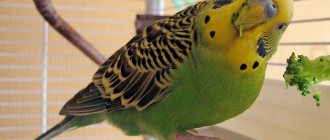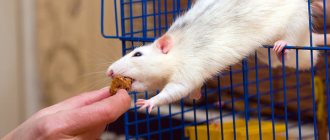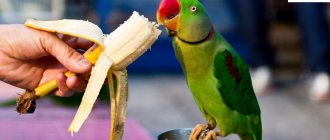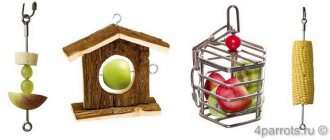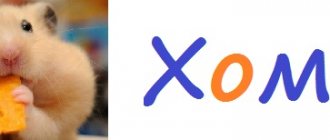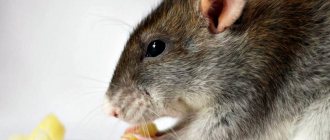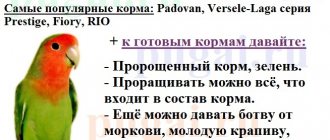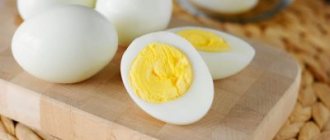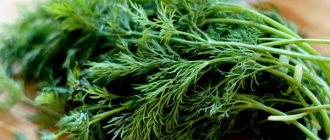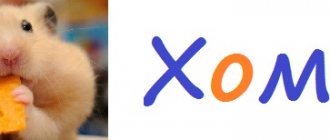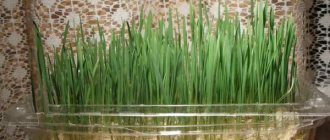Sometimes owners doubt which fruits can be given to parrots and which should be discarded. Birds living in their natural environment instinctively distinguish edible fruits from poisonous ones. You should not deprive your feathered pet of tasty and healthy treats - they are necessary for health. You can pamper your parrot with bright, sweet delicacies and reward him for good behavior.
What fruits can parrots eat?
Parrots can and should be fed fruits: they are rich in vitamins, sugars, fiber, and microelements. The list of permitted fruits is impressive; it contains most types of fruit crops. It is permissible to include in your daily diet:
- apples;
- pears;
- peaches;
- apricots;
- dates;
- grape;
- kiwi.
Feel free to give pears to parrots and apples grown in local orchards. The peel contains concentrated nutrients, so it is not advisable to cut it off. Beautiful imported apples are also allowed, but the wax should be thoroughly washed off with hot water.
Pineapple is high in vitamins, but this fruit is not on the table very often, but only on occasion. You can occasionally treat your pet to a ripe piece. Watermelons and melons are harmless only in August and September. There is no need to remove small bones - birds love to crack them open. There is no reason to wonder whether a parrot can have an orange. Citrus fruits are a storehouse of vitamin C. Birds readily peck at the white subcortex and partitions, and do not disdain the juicy pulp.
You shouldn't take risks by offering papaya and mango to your bird. These fruits are picked unripe to extend their shelf life. They contain substances harmful to birds. But pomegranate is good for the intestines: if a feathered pet pecks at the peel, it will not have inflammatory processes.
Attention! Regarding persimmons, so adored by parrots, one thing can be said: they are not prohibited, but only in a ripe state. If persimmon leaves an astringent aftertaste, it means it contains a lot of tannin, a compound with tannic properties. It can cause digestive upset in birds.
Fruit menu
Introduce fresh, dried and dried fruits into your parrot's menu. But keep in mind that it is better to make the preparations yourself. When eaten, the bird will not only receive pleasure, but also the necessary content of vitamins and minerals that are necessary daily for the good functioning of the body. Each fruit contains a different amount of useful components. When feeding fruit treats, follow the norm.
Many owners ask various questions: can budgies eat tangerines or kiwis, and what fruits to feed and which not. Let's begin to clarify these issues.
Here are the fruits you can give your budgies:
- Bananas are very nutritious, rich in calcium, magnesium and potassium. Content of fiber, all kinds of useful acids. A couple of pieces a day will be enough to maintain and saturate the body with essential vitamins;
- Apple is a vitamin cocktail, enzymes that are good for the digestive tract. Contains tannins, plant fibers and organic acids. The norm need not be limited;
- pomegranate is very necessary, its substances ensure the functioning of the cardiovascular system. A few grains a day, but introduce them gradually, starting with a minimum amount. The norm per day is no more than 1/6 part;
- kiwi – strengthens the parrot’s immunity. The fruits are leaders in vitamin C content. Protects the body from viruses;
- pears - for digestion, which is promoted by pectin. The composition contains carbohydrates, iron, phosphorus. Peel the skin first. Give in any quantity;
- orange – contains fiber, essential oils, carbohydrates. Well protects the body from viral and infectious diseases. A small piece a day. Also add other citrus fruits to the menu. Dilute lemon juice with water;
- grapes are rich in microelements and vitamins. Give 2 - 3 berries without skin, there is no need to remove the seeds. Cleanses the body and removes toxins;
- pineapple - the composition has a positive effect on muscle tissue and strengthens blood vessels. Has general strengthening properties. Destroys proteins, helps digest and absorb protein foods.
- apricot is the owner of sugar, inulin, starch, provitamin A, iron, acid. Supports the immune system, prevents cardiovascular diseases;
Persimmon, mango, papaya, avocado - these exotic fruits are not recommended to be given to your pet.
Important! Add a variety of edible berries, fresh or frozen, to your diet. You can prepare it yourself in the summer. The treat must be fresh and well washed, otherwise it will lead to serious illness and death.
All fruits should be peeled and cut into pieces. Remove the seeds, which are dangerous because they contain hydrocyanic acid. It is recommended to feed with vitamins from your garden, so-called natural products. Store-bought fruits often contain an abundance of nitrates and other substances that are detrimental to the health of the parrot.
The parrot does not want to eat fruit: what is the reason
Parrots are curious, but they are afraid of new things. If the bird has never seen or tasted the fruit, it will be difficult to convince it to eat. No matter what form you offer the appetizing fruits, the bird simply ignores the treat. Also, not all fruits are readily eaten by a parrot when it is sick.
Birds in pet stores and on the market are most often kept in an economy mode: cheap food is used, the cage is rarely cleaned, and several birds live in crowded conditions. Constant stress causes a feeling of fear and wariness in birds. They are afraid to try something new, and they get used to a simple grain mixture.
Do budgies like apples?
Many novice poultry keepers are interested in whether budgies can eat apples and in what quantities. These fruits contain many useful substances that have a beneficial effect on all types of parrots, including budgies. They have aromatic, tasty and at the same time crispy and firm flesh, which is why parrots love them very much. In the wild, these birds happily eat ripe and juicy tree fruits; apples are a good alternative to the natural diet in captivity.
Parrots eat sweet fruits most readily; Sour fruits can be avoided if the bird has a choice. However, sweet foods contain a lot of sugars, the excess of which is harmful to the health of parrots. Therefore, apples should be given to your budgie in moderation; they should not be the main part of the diet.
How to teach a parrot to eat fruit
When the chick is actively interested in everything around him, you need to start feeding him fruit. But what if you bought an adult with character? A wayward pet may stubbornly refuse succulent feeding, and this will have a bad effect on its health.
Like picky children, birds need to be introduced to new food gradually, patiently, unobtrusively. Experiment, act outside the box, be creative. There are many ways to outwit a cautious pet:
- Peel a ripe banana for your parrot, press grains from dry food into the pulp and place it between the bars of the cage. When pulling out familiar food with its beak, the pet will involuntarily try a banana.
- Chop or grate fruits, puree them, or squeeze out juice. Make fruit salads. Different shapes, textures and colors of food can attract birds.
- Mix small particles of fruit into the main feed. There is a chance that your ward will grab a new product along with the grain. Of course, such a mixture cannot be left in the feeder for a long time, otherwise it will spoil.
- Take the fruit holders, hang them and place them inside the cage. A parrot may mistake fruit kebabs on skewers for a toy. Perhaps, while playing, he will swallow a piece and taste it.
- Pour boiling water over dried apricots, prunes, dry apples, and figs. The bird may not like raw fruits, but it will love dried ones. Just not candied fruits - they contain a lot of sugar.
Worth a try! Demonstratively, gnawing on a juicy pear, apple, and peach with gusto. An inquisitive bird will want to know what the owner is eating that is so delicious, it will try to peck at a piece.
One of the easiest methods to introduce a bird to eating fruit is to organize collective feeding. In a single cage space, being close to its neighbors, the parrot will try to grab food before everyone else. It's okay if the cereal and juice fly all over the place. Some portion of the treat will still end up in the stomach.
What should you do if your parrot accidentally swallows an apple seed?
While apple seeds may not always have an adverse effect on your parrot, it is important to keep a close eye on them if they accidentally ingest them.
Signs that the seed may be causing illness may include loss or increase in appetite, closed eyes, limited mobility, shortness of breath, increased thirst, isolation, weight loss and diarrhea.
If you notice any of these symptoms, take your pet to the vet immediately.
If you are very concerned about your parrot or if he has eaten several seeds, do not wait for a reaction or symptoms to appear. Take them to the vet immediately after ingestion and explain the situation. Again, better safe than sorry.
Berries for the parrot
Parrots can eat not only fruits - they love to feast on berries. Make sure you always have fresh, dried or frozen fruits in stock:
- Rowan;
- currant;
- irga;
- rose hip;
- honeysuckle;
- raspberries;
- gooseberry;
- chokeberry.
At the beginning of summer comes the season of fragrant strawberries. It contains vitamin C and antioxidants, so its benefits are undeniable. The answer to the question whether a parrot can eat strawberries is only positive if the amount of nitrates does not exceed the norm.
The gifts of the swamp are tasty and healthy: cranberries, lingonberries, blueberries, cloudberries. Birds often peck at the berries, getting to the seeds - their favorite food.
Attention! Small parrots may choke on round berries while trying to swallow them whole. The treat must be crushed to protect the pet from death.
Frozen berries retain all the vitamins, so this method of preparation is best suited. You should not pour berries into the feeder straight from the freezer; let them melt, otherwise the bird will catch a cold. You can make compote without sugar from dry berries. Fruit and berry seeds are not garbage, they are needed for training and strengthening the beak. Birds have fun by chewing shells with their beaks.
Berry diet
In addition to fruits, parrots are very fond of berries. They can be eaten fresh or pureed. It is better to choose fresh rather than store-bought fruits, especially if possible. A good option is to cook compote from different berries. It needs to be brought to a boil; there is no need to add sugar.
Raspberries
Raspberries also help improve immunity very well and are used as a preventive measure not only by people, but also by birds. Most parrots prefer to eat it as a treat.
It is better to purchase sweet varieties.
Currant
Rich in various vitamins and microelements. It is not necessary to remove the seeds, but it is better to remove them from the branches. It would be a good idea to make sweet puree.
Gooseberry
Gooseberries must be given to birds in their entirety, removing the fruits from the branches. You can feed whole fruits or mix them into purees. You can also cook unsweetened compote.
Strawberry
The berry is rich in vitamin C and antioxidants. Preference should be given to fresh berries. If possible, you should pay attention to the amount of nitrates in the product; if they are exceeded, it is better to remove them from the diet. They can be pre-frozen, the vitamins from the composition will not go anywhere. But before serving, you need to warm them up a little, otherwise the parrot may catch a cold and get sick.
Strawberries
Strawberries differ from strawberries or raspberries in slightly less sugar, but the amount of microelements is no less. It is better to alternate its use with sweeter fruits.
Cherry
Rich in fiber, sugar and various microelements. You can serve it in any convenient form; remove the bone first.
You can leave it for your pet as entertainment and exercise for the beak.
Cherries
It is most similar to cherry in its composition. The feeding procedure is similar.
Blackberry
Blackberries are good for pets. It improves vision and helps improve immunity. No chemicals are used during cultivation, which means there is no harm.
Blueberry
A very sweet berry that should be given to your pet occasionally.
If it is not possible to purchase fresh food, it is better to wait for the season. Otherwise, there is a high probability that the bird will not eat the treat.
Blueberry
It’s quite difficult to get fresh blueberries, so if the opportunity arises, it’s better to take more and freeze them for the future. Warm slightly before serving. Will strengthen the immune system.
Cranberry
If the owner likes to walk through the forests to pick berries or mushrooms, it would be useful to collect a certain amount of cranberries. The feathered one will appreciate the delicacy. First you need to remove the fruits from the branches.
Cowberry
The situation is completely similar to cranberries. It’s better to assemble it yourself and choose something rarer in the store. Stir into puree before serving.
Kalina
Viburnum is quite easy to grow in your own garden. If you add raspberry, gooseberry and cranberry bushes to the tree, the bird will be very happy with the delicious compote made from these fruits.
Rowan chokeberry
Rowan should first be dried, since birds do not really like it fresh. Before serving, add water and soak a little.
Allows you to get a large number of different microelements and vitamins.
Red rowan
The main difference from the berry from the previous paragraph is less sugar. It contains no less vitamins and microelements. It is also better to dry it first.
Rose hip
Rose hips are popular as an immune-supporting food. It is also recommended for use by feathered pets to prevent various diseases. The ideal option is to make puree or cook unsweetened compote.
What vegetables should I give my parrot?
Fresh vegetables are an essential nutritional element for poultry. There is no point in giving boiled or stewed vegetables, since beneficial substances are lost during heat treatment. It will be great if you can not only teach your parrot to eat fruits, but also raw vegetables:
- carrots, they contain a lot of vitamin A;
- turnips, which can replace apples with their sweetness;
- beets, valuable for microelements;
- pumpkin, which has vitamins A, D, E, K;
- cucumber with its delicious seeds;
- zucchini, rich in dietary fiber;
- tomato with antioxidant - lycopene;
- bell pepper
If you doubt whether your budgie can eat cabbage, feel free to disassemble the cabbage into leaves and treat your pet. Cabbage is a long-lasting vegetable; in the cold season you cannot do without such feeding.
On a note! Instead of dry corn, you can give fresh grains of milky ripeness. Young cobs are not only tasty and healthy - they amuse the parrot, like a toy. After eating the grains, the bird can play with the stalk.
Vegetable menu
Fresh vegetables are an integral part of a budgie's diet. Give what you need every day.
Let us explain what vegetables can be given to a budgie:
- cabbage - white cabbage, broccoli, Peking cabbage and other types of this family. Everything contains a lot of all kinds of useful components. It is beneficial for the stomach when consumed, stimulates metabolism and easily cleanses the body of waste and toxins;
- carrots – the root vegetable contains carotene, lysine, ascorbic and pantothenic acid. Promotes pet growth and good vision. One piece a day is enough;
- pumpkin - in addition to its aesthetic qualities, has many useful components. The pulp is saturated with all kinds of vitamins, magnesium, potassium, iron. Removes toxins and excess cholesterol;
- cucumber – a huge content of vitamin E. A rich community of minerals. Helps in the absorption of food and normalize metabolism;
- beets - occupies a leading position in the presence of useful components. It has antioxidants and many other useful minerals necessary for the life of a budgie. Provides a wide range of benefits to improve the functioning of the body.
- Tomato or tomato has obvious benefits for your pet; it is a powerful antioxidant. Is a source for the health of the parrot. Normalizes metabolism, prevents the appearance of fungal diseases.
What vegetables are contraindicated for parrots?
Some vegetables are very harmful to parrots. For example, daikon and radish are too spicy to taste. This also includes celery, onion and garlic - they contain essential oils that are difficult for a bird’s stomach to digest. In large quantities, these components can cause serious diseases of the digestive system.
Raw eggplant is bitter and also contains solanine. True, there are practically no toxins in white varieties of this vegetable. If you want to offer your pet eggplant, choose from the white varieties. Potatoes contain a lot of starch, which is difficult to digest.
The best vegetables for budgies are considered to be home grown without chemicals.
Can a parrot eat apple seeds?
NO! While most fruits are safe for parrots to eat in small quantities, some fruits contain seeds that can be toxic. Apples are one such fruit.
While apples are safe to eat on their own, apple seeds and pits contain small traces of the heart-toxic compound cyanide, which can be fatal to your parrot.
Before feeding your parrot, thoroughly peel and core the apple to avoid feeding them toxins that could harm them.
What greens are good for parrots?
A balanced diet includes fresh grass. There is nothing difficult in supplying your pets with lush green stems even in winter. Salad greens grow beautifully in boxes on the windowsill, pleasing the eye with bright colors. In spring and summer, you can pick grass on lawns away from dusty roads:
- plantain;
- clover;
- nettle;
- knotweed;
- woodlice;
- burdocks.
The collected greens must be washed in running water, and the fleshy leaves must also be scalded with boiling water.
To maintain the health and cheerful mood of your parrot, fulfill your main task - feed it healthy and satisfying. Observe the behavior of your feathered pet, control the amount of food eaten, and adjust the diet taking into account established habits. And don't forget about delicious fruits and vegetables.
How and in what form can it be given?
Before allowing the parrot to taste the juicy and aromatic fruit, it should be divided into small pieces comparable to the size of the individual. In addition to small pieces, you can grate an apple with carrots; such a salad mixture can not only saturate your pet, but also more than compensate for all the substances the body needs. In addition, you can give chopped carrots and apples, offering your pet a crunch. Parrots love these products, moreover, in tandem, they represent an ideal composition of vitamins and microelements.
Why can't you give too many apples?
Fruits contain large amounts of sugars. With excessive consumption of sweet foods, your parrot may develop metabolic disorders, as well as diabetes. In addition, these fruits contain a lot of acids. When they enter the digestive system, they irritate the gastrointestinal mucosa, which causes inflammation. If you overfeed sour fruits, your parrot will develop diarrhea, leading to the loss of a large amount of fluid and preventing the absorption of nutrients from the feed.
On a note! To prevent overfeeding, it is allowed to give small parrots no more than 1/6 part per day, large species - a little more.
What's prohibited
The curiosity of budgerigars sometimes backfires on their owners, so you need to keep an eye on what the pet pecks.
Ornithologists categorically prohibit feeding parrots from the common table, because... Human food is very poorly tolerated by birds and can cause irreparable damage.
Do you give your parrot fruit?
Yes No
The following are contraindicated for a feathered pet:
- papaya;
- mango;
- pomelo;
- persimmon;
- avocado.
These fruits are picked while still unripe, and they reach their ripeness only in the carrier’s car. In addition, their juice is rich in glycosides, papin and various alkaloids, which are poison for parrots.
Birds are not against dried fruits, but they can only be given after preliminary soaking . At the same time, all types of candied delicacies are contraindicated, but you can offer the bird dried fruits (raisins, prunes, dried apricots) pre-steamed with boiling water.
Is there any harm
If a parrot has stomach problems, such as high acidity, then apples should be abandoned in favor of fruits with a more gentle composition: bananas, peaches, plums, etc. The fruits should also not be given to immature young animals who have not yet begun to eat on their own.
It is better to refrain from treating your pet with apple seeds . The seeds contain amygdalin glycoside, which releases toxic substances when processed. They will not cause harm to the body of adults and large individuals, such as cockatoos, macaws or African grays, but small birds - lovebirds or budgerigars - can be poisoned.
Some parrots cannot tolerate certain elements in principle, which is expressed by allergic reactions of various kinds. Therefore, before including apples in the diet, it makes sense to give your pet a small piece to try.
The fruit selection procedure deserves special mention. It often happens that a beautiful-looking and tasty fruit turns out to be a carrier of dangerous substances. And if the human stomach has more or less adapted to pesticides and other chemicals, then the gastrointestinal tract of a bird can cause serious problems, and in difficult cases lead to death.
Key points when choosing apples:
- presence of damage;
- elasticity;
- color;
- size;
- smell.
There should be no dents or dark spots on the surface. If, when you press on the peel, it bends easily, then most likely the apple is not fresh. Too bright colors should immediately alert you. Good fruits have a uniform and non-flashy color.
Better to give up the giants. Large sizes are largely the result of chemicals, not agricultural technology . The best option is a medium-sized apple. The fruits must emit a characteristic aroma for the crop. The abundance of chemicals partially neutralizes the smell, so its absence is a bad sign.
Some people are afraid of radionuclides in apples and GMOs. In fact, these are unfounded fears. Radionuclides accumulate only in the soil, and apples grow on trees. Given the existing varietal diversity, improving apples at the genetic level is simply unprofitable. It is more practical to carry out another selection.
Birds' favorite fruit
In the habitats of exotic birds, this culture is found quite often.
Parrots are not averse to eating the fruits of both wild trees and fruits in cultivated plantings on farmland. In terms of availability, demand and cost, apples are the No. 1 fruit in Russia. The culture has more than 7,500 varieties.
The first domesticated apple trees appeared 5,000 years ago on the territory of modern Kazakhstan.
Considering other fruits, the composition of apples can be called unique. The fruits contain about 80% water and about 20% nutrients. Almost everything in apples is useful: pulp, peel and even leaves.
Popular varieties:
- White filling;
- mekintosh;
- Antonovka;
- Jonathan;
- melba;
- Simirenko.
The mentioned varieties are distinguished by good taste and an abundance of elements beneficial to the animal’s body.
Right choice
The first thing a parrot owner should pay attention to when buying fruit is the season. Birds are very sensitive to pesticides and chemicals, so they will either not eat fruits grown in a greenhouse at all, or they will simply be poisoned.
On supermarket shelves, products are often treated with special products that give them shine and shine. Despite their attractive appearance, such fruits are not recommended to be given to birds. So it’s worth looking at the naturalness of the look and the consistency of its consistency.
Fruits should not raise any suspicion about their quality. Freshness, ripeness, absence of mold and rot are prerequisites for quality nutrition. It is worth looking at 6-7 fruits to understand the quality of the batch.
